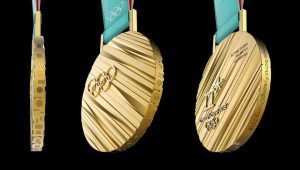…Along with the prestige of being a medal recipient, the awards themselves have worth. The Olympic silver medal value, for example, may surprise you. However, just how much you can get for a medal varies depending on how you break it down.
The original article has been edited here for length (…) and clarity ([ ]) by munKNEE.com – A Site For Sore Eyes & Inquisitive Minds – to provide a fast & easy read.
One way to cash in on a medal is to melt it down and sell it for scrap metal. [The gold medal consists of silver with a purity of 99.9% plated with 6g of gold; the silver medal has a purity of 99.9% while the bronze medal is made of copper medal (Cu90-Zn10). Source]
Gold, silver, and bronze medals weigh…[586g; 580g; and 493g, respectively. Source] and measure at about one-third of an inch thick and 92.5 mm in diameter, according to the PyeongChang Organizing Committee. Silver medals are valued at…approximately $320; gold medals are worth a bit more…at about $577 and bronze medals aren’t even worth melting down though; they are composed of a copper alloy and would only get you $3.50.

Of course, melted down metals are often worth a lot less than intact. Instead, selling them at auction is the way to go if you really want to cash in. Jonathan Scheier, the consignment director of sports memorabilia at Heritage Auctions, told TIME that silver medals earn between $10,000 and $30,000 at auction — less than the $20,000-$50,000 you would get for a gold, but more than the under $10,000 price tag for bronze.
Not all medals are created equally, though. Scheier also told TIME the recipient of the medal also influences its value: For example, the gold medal awarded to track and field star Jesse Owens at the 1936 Berlin Olympics sold for a whopping $1,466,574 at auction, according to NorthJersey.com. In that case, it was the context of the award that upped its value. Owens, a black man, won four gold medals that year and symbolically debunked Hitler’s claim of “Aryan supremacy” in athletics. Context, more than content, made his medal so valuable. Value also differs depending on which Olympic Games the medal comes from. In general, Summer Olympics medals are worth more, but that can vary as well.
[The medals…reflect the traditions and culture of the host nation. Their design was inspired by the texture of tree trunks, with the front bearing the Olympic rings and dynamic diagonal lines that reflect both the history of the Olympics and the determination of the participants. On the reverse, meanwhile, are stated the discipline, event and the PyeongChang 2018 emblem. In total, 259 sets of the medals have been made.
They are the work of celebrated South Korean designer Lee Suk-woo, who incorporated Hangeul – the Korean alphabet and the foundation of Korean culture – into their design through a series of consonants symbolising the effort of athletes from around the world, who will come together as one to compete at PyeongChang 2018.
The ribbon from which the medal hangs is an equally important part of the design and has been created using gapsa, a traditional South Korean fabric. The light teal and light red ribbon from which the medals hang is also embroidered with Hangeul patterns and other designs. Source]

The value of an Olympic medal is dependent on a number of factors, and you could be looking at hundreds, or thousands, or even millions of dollars. The pride and sense of accomplishment that comes from earning such a distinction is priceless, but it’s always good to know that there is another way to cash in on your success.
Related Article From the munKNEE Vault:
1. 2016 Olympic Gold Medals: How Much Gold Do They Actually Contain?
Have you ever wondered if the Olympic medals are actually made of gold at all? It turns out today’s gold medals actually contain very little gold at all.
 munKNEE.com Your Key to Making Money
munKNEE.com Your Key to Making Money